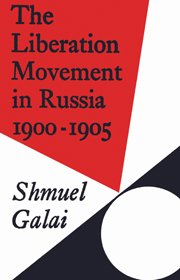Book contents
- Frontmatter
- Contents
- Dedication
- Acknowledgments
- Note on dates, etc.
- List of abbreviations
- Introduction
- Part One ORIGINS
- Part Two THE FORMATION OF THE LIBERATION MOVEMENT
- Part Three WAR AND REVOLUTION
- 9 Setback and recovery
- 10 ‘No enemies on the left’
- 11 Unleashing the Revolution
- 12 Defeat in victory
- Appendix A The origins of Beseda
- Appendix B A bibliographical note on the writings of Kuskova and Prokopovich in the years 1898–9
- Appendix C Note on sources on the formation of the Liberation Movement
- Bibliography
- Index
12 - Defeat in victory
Published online by Cambridge University Press: 22 September 2009
- Frontmatter
- Contents
- Dedication
- Acknowledgments
- Note on dates, etc.
- List of abbreviations
- Introduction
- Part One ORIGINS
- Part Two THE FORMATION OF THE LIBERATION MOVEMENT
- Part Three WAR AND REVOLUTION
- 9 Setback and recovery
- 10 ‘No enemies on the left’
- 11 Unleashing the Revolution
- 12 Defeat in victory
- Appendix A The origins of Beseda
- Appendix B A bibliographical note on the writings of Kuskova and Prokopovich in the years 1898–9
- Appendix C Note on sources on the formation of the Liberation Movement
- Bibliography
- Index
Summary
On 19 May (1 June) 1905 Nicholas II received full details of the unprecedented Russian naval catastrophe in the Tsushima Straits. After a voyage of nearly eight months, fraught with disaster from the first (on the night of 8/21 October 1904 the Russian Baltic fleet had opened fire on English fishing boats near Dogger Bank in the belief that they were Japanese, thus bringing relations with Britain to breaking-point), almost the entire Russian fleet had been annihilated by the Japanese in a matter of a few hours on 14/27 May. This spelled the end of the Tsar's hope that he might succeed in winning the war. He now bowed to the inevitable and accepted offers of mediation from Wilhelm II and Theodore Roosevelt. The supreme war council he held on 24 May decided almost unanimously that the war should be ended, since ‘the re-establishment of internal order is much more important than victory over the external enemy’. But subsequent negotiations, conducted at first in secrecy, progressed at a very slow pace and when peace was eventually concluded on 23 August (5 September) 1905, it was too late to prevent the revolutionary process from reaching its peak.
As might have been expected, public opinion reacted violently to the news of the Tsushima disaster. Zemstvo assemblies, town dumas and other public organizations, as well as the vast majority of the press, called for immediate peace and the convening of elected representatives of the people in order to conclude a peace settlement.
- Type
- Chapter
- Information
- The Liberation Movement in Russia 1900–1905 , pp. 251 - 272Publisher: Cambridge University PressPrint publication year: 1973

